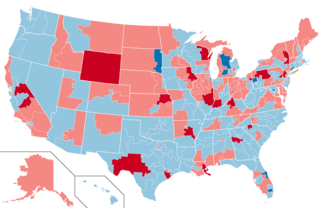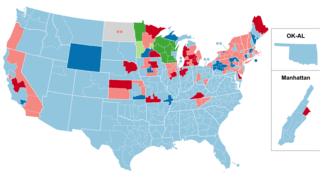| District | Incumbent | Party | First elected | Result | Candidates |
|---|---|---|---|---|---|
| Tennessee at-large | William C. C. Claiborne | Democratic- Republican | 1797 | Incumbent re-elected. | √ William C. C. Claiborne (Democratic-Republican) Unopposed [1] |
| Elections in Tennessee |
|---|
 |
| District | Incumbent | Party | First elected | Result | Candidates |
|---|---|---|---|---|---|
| Tennessee at-large | William C. C. Claiborne | Democratic- Republican | 1797 | Incumbent re-elected. | √ William C. C. Claiborne (Democratic-Republican) Unopposed [1] |
The Kennedy family is an American political family that has long been prominent in American politics, public service, entertainment, and business. In 1884, 35 years after the family's arrival from County Wexford, Ireland, Patrick Joseph "P. J." Kennedy became the first Kennedy elected to public office, serving in the Massachusetts state legislature until 1895. At least one Kennedy family member served in federal elective office from 1947, when P. J. Kennedy's grandson John F. Kennedy became a member of Congress from Massachusetts, until 2011, when Patrick J. Kennedy II retired as a member of the U.S. House of Representatives from Rhode Island.

The speaker of the United States House of Representatives, commonly known as the speaker of the House, is the presiding officer of the United States House of Representatives. The office was established in 1789 by Article I, Section II, of the U.S. Constitution. By custom and House rules, the speaker is the political and parliamentary leader of the House and is simultaneously its presiding officer, de facto leader of the body's majority party, and the institution's administrative head. Speakers also perform various other administrative and procedural functions. Given these several roles and responsibilities, the speaker usually does not personally preside over debates—that duty is instead delegated to members of the House from the majority party—nor regularly participate in floor debates.

The federal government of the United States is the national government of the United States, a federal republic located primarily in North America, composed of 50 states, five major self-governing territories, several island possessions, and the federal district and national capital of Washington, D.C., where most of the federal government is based.
A member of congress (MOC), also known as a congressman or congresswoman, is a person who has been appointed or elected and inducted into an official body called a congress, typically to represent a particular constituency in a legislature. The term member of parliament (MP) is an equivalent term within a parliamentary system of government.

These are tables of congressional delegations from Indiana to the United States House of Representatives and the United States Senate.

The 1988 United States House of Representatives elections was an election for the United States House of Representatives on November 8, 1988, to elect members to serve in the 101st United States Congress. They coincided with the election of George H. W. Bush as president. Although Bush won with a strong majority, his Republican Party lost a net of two seats to the Democratic Party, slightly increasing the Democratic majority in the House. It was the first time since 1960 that an incoming president's party lost seats in the House.

The 1980 United States House of Representatives elections was an election for the United States House of Representatives on November 4, 1980, to elect members to serve in the 97th United States Congress. They coincided with the election of Ronald Reagan as president, defeating Democratic incumbent Jimmy Carter. Reagan's victory also allowed many Republican House candidates to secure elections. The Republicans gained a net of 35 seats from the Democratic Party. The Democrats nonetheless retained a significant majority, unlike the Senate elections, where Republicans gained control of the chamber. However, many Democratic congressmen from the south frequently took conservative stances on issues, allowing Republicans to have a working ideological majority for some of President Reagan's proposals during his first two years in office.

The 1978 United States House of Representatives elections was an election for the United States House of Representatives on November 7, 1978, to elect members to serve in the 96th United States Congress. They occurred in the middle of Democratic President Jimmy Carter's term, amidst an energy crisis and rapid inflation. The Democratic Party lost a net of 15 seats to the Republican Party, and thus lost their two-thirds supermajority, but still maintained a large 277-seat majority.

The 1974 United States House of Representatives elections were elections for the United States House of Representatives on November 5, 1974, to elect members to serve in the 94th United States Congress. They occurred in the wake of the Watergate scandal, which had forced President Richard Nixon to resign in favor of Gerald Ford. This scandal, along with high inflation, allowed the Democrats to make large gains in the midterm elections, taking 48 seats from the Republicans, and increasing their majority above the two-thirds mark. Altogether, there were 93 freshmen representatives in the 94th Congress when it convened on January 3, 1975. Those elected to office that year later came to be known collectively as "Watergate Babies." The gain of 49 Democratic seats was the largest pickup by the party since 1958. Only four Democratic incumbents lost their seats.

The 1970 United States House of Representatives elections was an election for the United States House of Representatives held on November 3, 1970, to elect members to serve in the 92nd United States Congress. They occurred in the middle of Richard M. Nixon's first term as president. His party, the Republican Party, lost a net of 12 seats to the Democratic Party, which thereby increased its majority in the House. Many viewed the results of the 1970 election as an indication of public fatigue over the ongoing Vietnam War as well as the fallout from the Kent State Massacre.

The 1968 United States House of Representatives elections were elections for the United States House of Representatives on November 5, 1968, to elect members to serve in the 91st United States Congress. They coincided with Richard M. Nixon's election as president. Nixon's narrow victory yielded only limited gains for his Republican Party, which picked up a net of five seats from the Democratic Party. The Democrats retained a majority in the House.

The 1960 United States House of Representatives elections was an election for the United States House of Representatives on November 8, 1960, to elect members to serve in the 87th United States Congress. They coincided with the election of President John F. Kennedy and was the first house election to feature all 50 current U.S. states.

The 1940 United States House of Representatives elections were elections for the United States House of Representatives to elect members to serve in the 77th United States Congress. They were held for the most part on November 5, 1940, while Maine held theirs on September 9. They coincided with President Franklin D. Roosevelt's re-election to an unprecedented third term. His Democratic Party narrowly gained seats from the opposition Republican Party, cementing their majority. However, the election gave firm control of the US House of Representatives and Senate to the New Dealers once again, as Progressives dominated the election.

The 1934 United States House of Representatives elections were elections for the United States House of Representatives to elect members to serve in the 74th United States Congress. They were held for the most part on November 6, 1934, while Maine held theirs on September 10. They occurred in the middle of President Franklin D. Roosevelt's first term. The Democratic Party continued its progress, gaining another 9 net seats from the opposition Republican Party, who also lost seats to the Progressive Party. The Republicans were reduced below one-fourth of the chamber for the first time since the creation of the party. The Wisconsin Progressive Party, a liberal group which allied with the Democrats, also became a force in Wisconsin politics.

The 1920 United States House of Representatives elections were elections for the United States House of Representatives to elect members to serve in the 67th United States Congress. They were held for the most part on November 2, 1920, while Maine held its on September 13. They coincided with the election of President Warren G. Harding, the first time that women in all states were allowed to vote in federal elections after the passage of the 19th Amendment.
This is an incomplete list of lists pertaining to the United States Congress.

The United States House of Representatives is the lower chamber of the United States Congress, with the Senate being the upper chamber. Together, they comprise the national bicameral legislature of the United States. The House is charged with the passage of federal legislation, known as bills; those that are also passed by the Senate are sent to the president for signature or veto. The House's exclusive powers include initiating all revenue bills, impeaching federal officers, and electing the president if no candidate receives a majority of votes in the Electoral College.